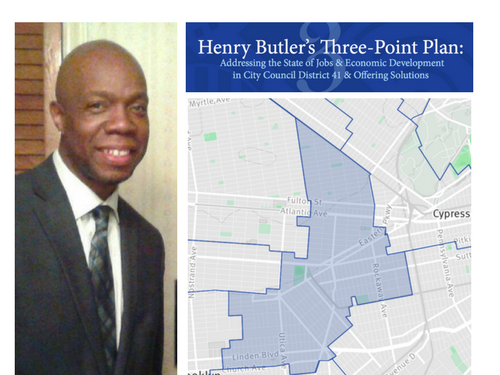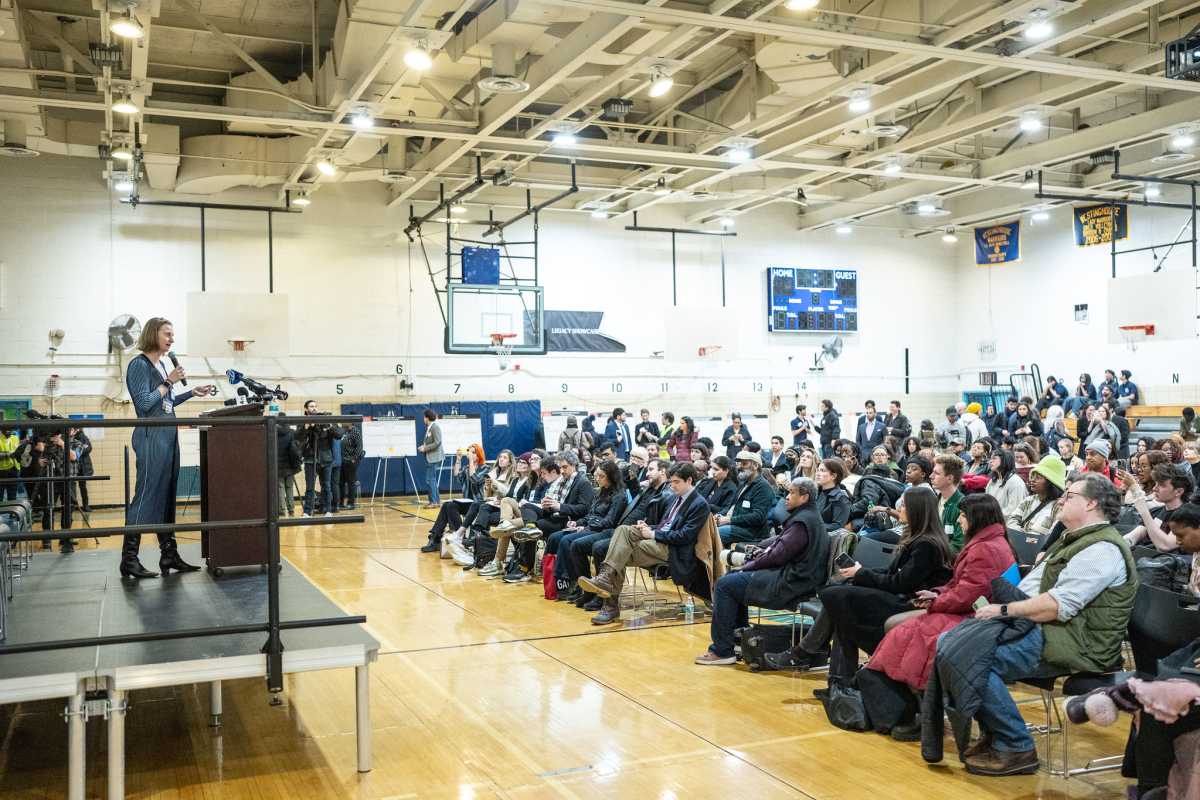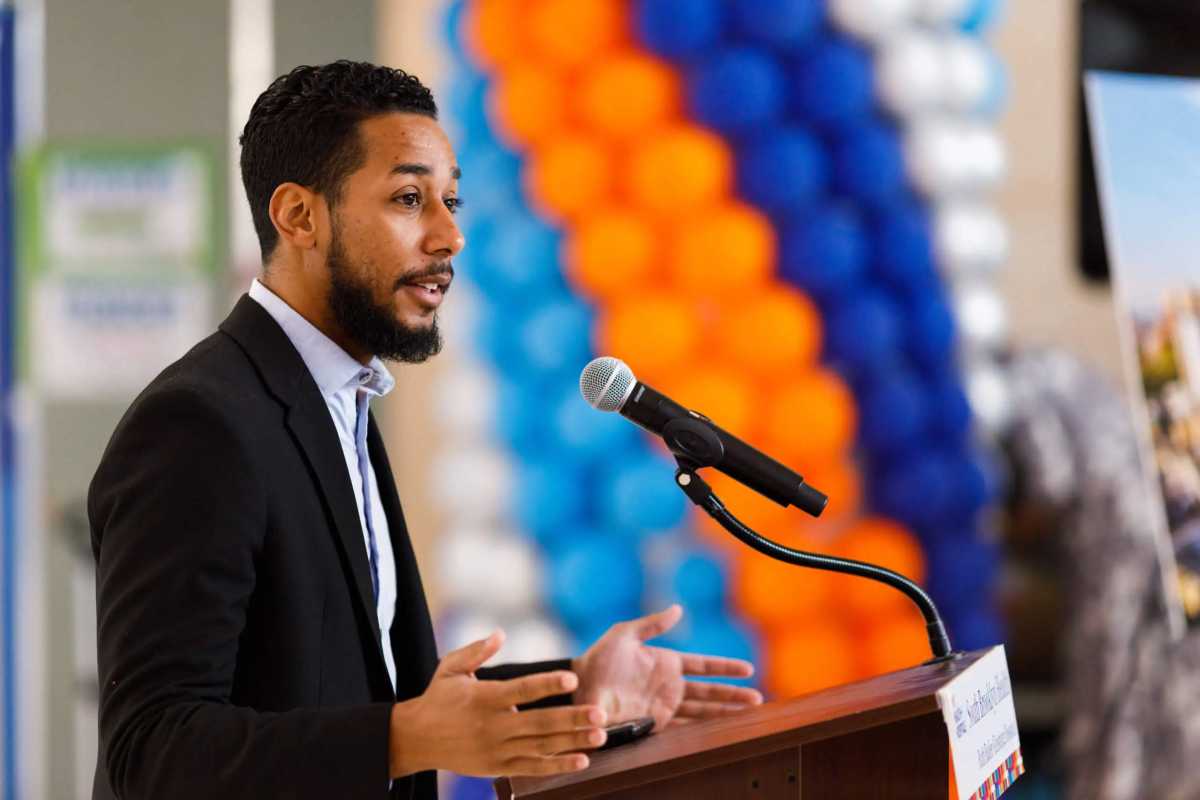
Henry Butler, one of the frontrunners in the Democratic primary race to succeed term-limited City Councilwoman Darlene Mealy, today released a three-point plan to grow employment, stem poverty and reduce crime in the economically challenged 41st City Council District.
“The people of Brownsville, Bedford-Stuyvesant, Crown Heights, East Flatbush and Ocean Hill are some of the most hardworking and determined citizens New York City has to offer, but we have been historically underserved and overlooked,” said Butler in releasing the plan.
Butler noted the district’s 14.2% unemployment rate is higher than all of Brooklyn (10.9%) as well as all of New York State (9.2%).

“Our community is strong, but the resulting effects of this reality are heartbreaking. Thirty-seven percent of our residents live below the federal poverty level, struggling to provide for their families. And as if living in poverty isn’t punishing enough, many of our neighbors are enduring homelessness. This includes our schoolchildren. One out of six District 41 students experienced homelessness within the past five years. Without jobs, people are finding themselves out on the street, with no way to build a better life for themselves,” he said.
On the employment part of the plan, Butler plans to attack the low rate of participation in existing workforce development programs to retooling the programs in new partnership with New York City Housing Authority (NYCHA) Presidents to communicate directly with individuals who are in need of workforce training opportunities. He will also push for a district-wide education initiative so that people seeking employment know exactly what resources are available to them.
“I also want to make these programs easily accessible to our homeless population. From 2012 to 2015, Brownsville, East Flatbush and parts of Crown Heights had the top three largest increases of families with children entering shelters, surpassing all other neighborhoods in Brooklyn. Our district has 26 homeless shelters and my plan calls for leveraging our shelter infrastructure to provide job search and training services,” said Butler.
The second prong of the plan is in giving added support to small businesses in the district so they can hire more locally.

Citing recent Census Bureau data, Butler said virtually all net new job creation over the past 30 years has come from new businesses less than one year old.
“I will work to give small businesses 100% tax breaks in the first five years of opening, because the first five years are a make-or-break period of time for small businesses and a tax break helps ensure that they are successful and providing jobs to the 41st District. Businesses will also be given tax breaks for hiring new workers and moving part-time workers to full-time, so that we can not only boost employment, but raise earning potential as well. Additionally, I propose tax breaks for the creation and expansion of employee-owned businesses. Studies have shown that employee-owned businesses have a higher annual job growth and lower rates of layoffs than non-worker cooperative businesses,” he said.
Butler said as a city council member he will also make sure that local businesses hire deserving people of all backgrounds, namely the formerly incarcerated, veterans and the long-term unemployed in exchange for tax breaks.
“I was shocked to learn that out of the 5,409 certified minority- and women-owned businesses registered with the city, less than 1% come from District 41. This is something I’m determined to change and I will fight to make sure that Mayor de Blasio’s 30% Minority and Women-Owned Business Enterprise participation program serves new businesses in our own district,” said Butler.
“With money now designated to support MWBE’s, I will make sure that our minority- and women-owned businesses in the community get their fair share of the funds. I will advocate for a new NYC Department of Small Business Services satellite office in the district to address the incredibly low rate of MWBE’s in our community,” he added.
The last prong of Butler’s plan calls for strengthening public-private partnerships that will boost employment throughout the district
“I propose creating our district’s first “economic pipeline,” or what one could call an “economic pipeline to the future.” I will facilitate strong public-private partnerships that will serve as a conduit for employment by encouraging businesses to invest in our job training programs and then ensuring employment for members of our community who participate in those programs,” he said.
Butler, a retired MTA conductor, and current Community Board 3 District Manager, said his extensive experience working with local elected officials and unions, uniquely qualifies him to put his plan into action upon Day 1 after getting elected to the city council.
To see the complete click here: HButlerPlan1_v5.










